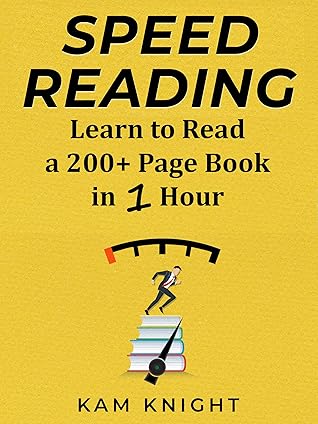More on this book
Community
Kindle Notes & Highlights
by
Kam Knight
Read between
May 16 - May 17, 2025
Introduction
I will be using this book as an comparison to How to Read by Mortimer Adler & Charles Doren
I think fast reading will ultimately come down to cognitive capacity and practice. Childhood conditioning - practice reading early in adolescence - will also play a indomitable role in adulthood capabilities, too.
This is also my first e-book, therefore, not only am I learning to read faster but also learning to use this Kindle.
we are all capable of reading better and faster than we ever imagined. We simply need to learn the correct ways to use our infinitely powerful eyes and mind.
With simple strategies that unleash the power of your mind and sight, the techniques in this book fill in the gaps teachers failed to cover to accelerate reading in ways you can’t imagine.
1.
Things I have read:
Science Magazines
Articles in class
YA dystopian novels
History books
Science books
Comic books
Online information articles
Subtitles to films/videos
Text messages
Forum posts
Reasons for reading the above:
I started my reading journey to fix myself, as I was miserable and capricious. This drive later turned into a feeling of moral obligation to take advantage of countless books I've been privileged to have access to.
There are other materials I've read to learn more about people important to me, especially in my life.
3.
Plan to read in the next month:
Immune by Philip Dettmer for entertainment and a biology lesson, as well as maintaining my healthy hobby of annotating.
Thinking Fast and Slow by Daniel Kahneman as that title has been rent free in my head since high school, it is time to now explore this adolescent fascination.
Why We Sleep by Mathew Walker as I want to know more about the science of it and how to improve it. I feel destined to read this book.
then there are some other educational materials I'll buy and read :)
4.
In my next year reading list:
The DC comics encyclopedia releases in November, which i am looking forward to reading to learn more about DC lore and gawkingly geek over the cool pictures!
I plan to read more science, history, and cultural books, as well as informative but colorfully pictured books for entertainment. I don't have a particular direction with my reading. I think I am trying to cross pollinate ideas, whereby I notice connections where others do not
Focus on control rather than speed
It begins with understanding the meaning of a sentence, then how that sentence fits into the paragraph, and then how the paragraph supports the larger chapter. Finally, how the chapter supports the overall piece.
This can be like learning how the human body works, starting with energy, to atoms, to molecules, to organelles, all the way up to the organism.
The following words, though, don't fall into that "iffy" category; they seem to be keepers, deserving of an entry in any comprehensive, or complete, dictionary.
This, is my initial guess for the topic sentence, as it has the transition, "though," and seems to be the most important assertion, governing why the person decided to write this paragraph in the 1st place
To truly ameliorate the dexterity to subsume written material, one must possess a wieldy argot. Without a philistine vernacular, it’s perverse to elucidate any prose. You would be quixotic to speed read without the aptitude to antithesize the words. Otherwise, it will create a gnawing sense of ennui.
Here is where the Kindle shows its efficacy to translate, though it failed to find a definition on some words whereas for others like "philistine" it failed to find a suitable definition, unless the author was being anti-Semitic :O
The mind evolved to comprehend spoken words before written words.
I know the book gave the advice to eliminate subvocalizing, so it might have not included what I'm about to propose to avoid confusing the reader, but I think the author missed the mark by not adding the advice of practicing saying out load what you are reading - trying to inflect tonality, mood, pacing, etc etc to what the reader thinks the author is speaking through. Not only does this makes unfamiliar words an audible stimuli and making it easier to say later, but to try to get in the head of the author. It's almost like acting! A practice I've come to realize is of utmost impprtance to self-development ^~^


